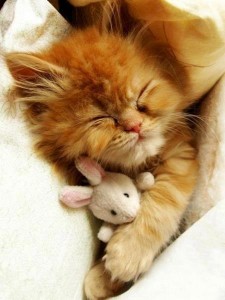These past two weeks have felt like a strange quasi-adulthood. I wake up at 7 most mornings, a thought that would make me laugh during the school year. After going for a run along the Hudson River, I return to my apartment with enough time to get ready and gulp down the cup of coffee that makes me fit for human company. I work from 10 to 6; if we don’t have an evening activity planned for afterwards I make dinner and then read, write, or spend time with other Moxies. The transition from 11:00 Pitchforks to 11:00 bedtime feels jarringly mature, as does trading in a summertime wardrobe of shorts and cut-up t-shirts for one of dresses and flats. It can feel like we’re playing at adulthood, particularly when I know that a college campus awaits me when I return from my semester abroad in January.
- The difference between midnight at Duke and midnight in New York, as told by kittens
This transition is all the stranger when I consider how I’ve spent the past 11 summers: at sleepaway camp, both as a camper and a counselor. Leaving was not an easy decision; the thought of leaving the campers I have watched grow pained me, as did the thought of a summer without my own lifelong friends. I chose to participate in Moxie knowing I would be giving up time at the place which I truly consider home, but sure that I would gain things from a summer in New York that would not be available to me at camp. I have constantly been reaffirmed in this decision; the past two weeks have taught me immense amounts, both academically and experientially. But even with this awareness, there is an even bigger and more frightening loss looming overhead – that of the person I am at camp.
I am my best self at camp: my least inhibited, most authentic, and kindest. Counselors are caretakers, but we are also professional role models – and that allows us to find within ourselves the qualities necessary to be one. I inevitably lose my sense of self during the year, overwhelmed by the constant Duke grind, and I have always relied on my summers to remind me of who I am and who I want to be. I am still searching for ways to connect with that self in a different space: as much as I tell myself that I can channel the energy I used to put into planning innovative camper activities into the work I do at NDWA, I have been struggling to align the two. I doubt that my silly and often downright weird camp self would be welcome in the workplace; and though I am sure there are ways to turn the lessons of camp into tools for the city, I have yet to discover them. This seems an enormous task: taking the things I like best about myself in an unique, informal setting and learning to bring them into the real world. I have always known that I would leave camp, but I have assumed that there would be pieces of myself that would always remain there. Perhaps this doesn’t have to be the case.


